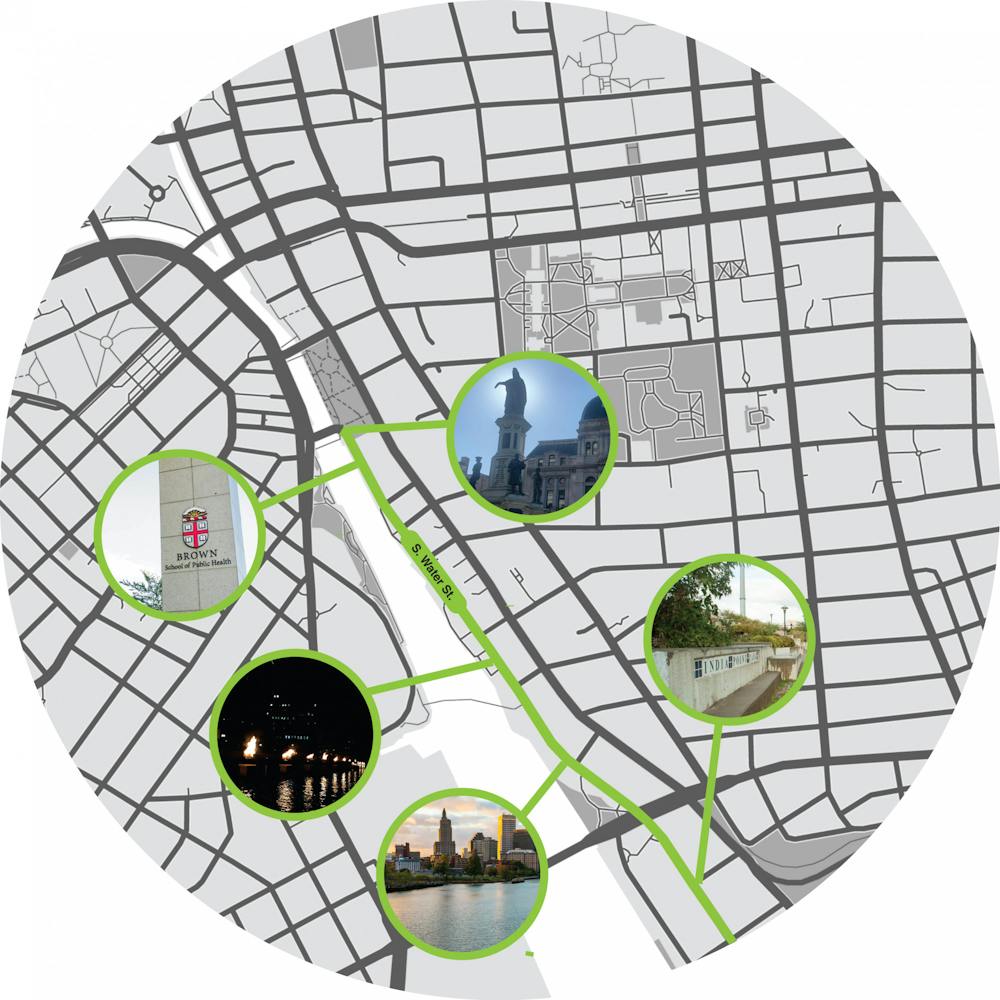Construction on the South Water Street bike lane recently concluded, ending a saga of tensions and legal back-and-forth between the City of Providence, the Rhode Island Department of Transportation and local groups and businesses, including the University.
The lane was built as part of the Providence Great Streets Initiative, an effort by the city to make streets more accessible for pedestrians and vehicles other than cars. RIDOT requested that the City halt construction until the project received approval from the Federal Highway Administration, but ultimately work on the trail proceeded uninterrupted and the FHWA declined to intervene.
Businesses along South Water, the University, RISD and community leaders cosigned a letter Oct. 1 to RIDOT asking for construction to be stopped because of traffic considerations and safety concerns with the design of the two-way bike path. One lane of traffic was closed off in September to create the bike trail and additional parking along South Water Street. The group of signatories had concerns that this would increase traffic congestion extending onto nearby streets.
“We want to be clear, we do not oppose creation of a bicycle path along South Water Street, but we do not think it should come at the expense of a lane of travel which is needed for travel, deliveries, RIPTA service and which is the only access road to the interstate highway I-195 East,” said the letter, which was also signed by representatives from the Jewelry District Association and restaurants along the bike path.
Albert Dahlberg, assistant vice president of government and community relations, signed the letter on behalf of the University.
“Our signature on the recent letter to RIDOT was intended to signal our concerns about safety issues associated with the current design of the South Water Street bike lane, particularly behind a Brown-owned building (121 South Main St.) during deliveries,” University Spokesperson Brian Clark wrote in an email to The Herald, reiterating that the University ultimately supports the two-way bike path. 121 South Main St. houses University departments such as the School of Public Health.
Clark wrote that because the trail takes up a full lane of traffic, it impacts deliveries made to the University’s building, which also houses Hemenway’s Restaurant, since larger trucks are forced to “extend into a single, active lane of vehicle traffic immediately near a corner with limited visibility for drivers traveling on the street.”
RIDOT wrote a letter to Providence Mayor Jorge Elorza Oct. 6 asking to stop construction on the bike lane, citing the Maintenance Agreement — a 1999 agreement that put modifications to South Water Street under the jurisdiction of the Federal Highway Administration. RIDOT threatened a $4.4 million lawsuit if the project went forward without approval from the FHWA.
“This is completely a legal matter that RIDOT responded to at the request of local businesses, including Brown University,” wrote Charles St. Martin, RIDOT chief of public affairs, in an email to The Herald.
Construction pushed forward despite RIDOT’s request. “The City has engaged the public in our Great Streets Plan from the start, ensuring the changing needs of our residents, the majority of whom overwhelmingly support our street safety improvements, are met,” Elorza wrote in an email to The Herald.
Representatives from RIDOT and the FHWA met with legal counsel regarding the South Water Street Trail Oct. 19. The FHWA decided it would not “implement any penalties against the City of Providence for the breach of contract” or intervene in the project, according to an Oct. 21 statement from RIDOT.
“It is our opinion that taking a lane of traffic on South Water Street creates traffic and safety issues but the FHWA, which was a signatory to the contract, does not want to get involved,” the RIDOT statement said. “Therefore, we will not press the issue any further.”
Ward 1 Councilman John Goncalves ’13 MA’15 said he received “hundreds of emails from constituents in support” of the new bike lane, and that critical constituents’ primary concern was about the reduction from two lanes to one on South Water Street.
He also said that the bike lane would reduce noise along South Water Street and improve pedestrian safety.
In a recent statement to supporters, Goncalves emphasized the importance of investing in pedestrian and bike infrastructure. “I understand why cars and trucks are the primary priority of highway engineers,” Goncalves wrote. “But creating well-designed city streets that are accessible and safe for all residents takes far more care and consideration.”
He added that new infrastructure can be an adjustment for residents and businesses, but that he thinks the bike path will improve the street in the end.
“There will certainly be bumps in the road, as folks get used to the new arrangement,” Goncalves wrote, “but ultimately, this infrastructure will create a myriad of benefits for neighborhood residents.”

Katy Pickens was the managing editor of newsroom and vice president of The Brown Daily Herald's 133rd Editorial Board. She previously served as a Metro section editor covering College Hill, Fox Point and the Jewelry District, housing & campus footprint and activism, all while maintaining a passion for knitting tiny hats.





